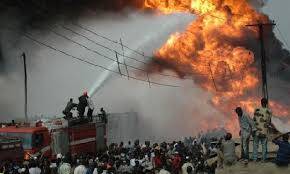Devastating Fire Razes Odawna Market Structures Near Kwame Nkrumah Interchange.
In a tragic turn of events early this morning, a massive fire swept through Odawna, a bustling commercial area near the Kwame Nkrumah Interchange in Accra, Ghana, destroying over 15 wooden structures. The incident has left many business owners devastated, with significant property losses reported.
The fire began in the early hours of the day, quickly engulfing the densely packed area, which is known for its vibrant markets and small-scale enterprises. Wooden stalls, which make up a significant portion of the structures in Odawna, provided fuel for the flames, accelerating the fire's spread. Firefighters from the Ghana National Fire Service (GNFS) were dispatched promptly and managed to contain the blaze before it could spread to nearby warehouses. Fortunately, no casualties were reported, but the affected traders are now grappling with the destruction of their livelihoods.
Swift Response From Firefighters
The GNFS's rapid response was instrumental in preventing the fire from causing further damage. Witnesses praised the team for their efforts, noting that the densely populated area and flammable materials posed significant challenges. Despite their commendable work, the aftermath has left a trail of devastation.
Impact on Traders and Residents
The fire has left many traders in despair as their shops, goods, and personal belongings were reduced to ashes. For many of them, these small businesses represent their sole source of income, and the losses are devastating. One trader lamented, “I’ve lost everything. I don’t know how I’ll recover from this.â€
The affected structures also served as makeshift homes for some individuals, compounding the tragedy. Displaced residents are now seeking temporary shelter, with community members stepping in to provide immediate assistance.
Recurring Fire Incidents in Odawna
This is not the first time Odawna has suffered from such incidents. The area has a history of fire outbreaks due to the high concentration of wooden structures, poor electrical wiring, and inadequate fire prevention measures. A similar fire in November 2020 destroyed goods worth thousands of Ghana cedis, underscoring the need for long-term solutions.
Call for Action
The recurring nature of these fires has sparked calls for improved infrastructure and stricter safety regulations in markets across the country. Experts have pointed to the lack of fire hydrants, poor wiring, and inadequate space between stalls as key contributors to such disasters.
Local authorities are now under pressure to investigate the cause of the fire and implement measures to prevent future occurrences. The Ghana National Fire Service has reiterated the importance of fire safety training for traders and the need for regular inspections to identify and mitigate risks.
Next Steps for Recovery
In the aftermath of the disaster, community leaders and local government representatives are coordinating efforts to assist those affected. Plans are underway to provide temporary relief, including food, clothing, and financial aid, to the victims. Additionally, discussions about rebuilding the market with more fire-resistant materials and improved safety measures are gaining momentum.
The Odawna fire serves as a stark reminder of the vulnerabilities in Ghana’s informal trading spaces. While the immediate focus is on recovery, the incident highlights the urgent need for systemic changes to protect lives and livelihoods in the future.
Conclusion
The fire at Odawna is a tragic event that has once again underscored the risks associated with densely packed markets and inadequate safety measures. While the prompt response from the Ghana National Fire Service helped to limit the damage, the losses experienced by traders and residents are immense. It is now imperative for stakeholders to work together to rebuild not just the physical structures but also the confidence of those whose lives have been upended. Long-term solutions, including improved infrastructure and fire safety education, are crucial to preventing such tragedies in the future.
This incident is a wake-up call for both authorities and market operators to prioritize safety and preparedness to protect Ghana’s vibrant market culture.




No comments yet
Be the first to share your thoughts!